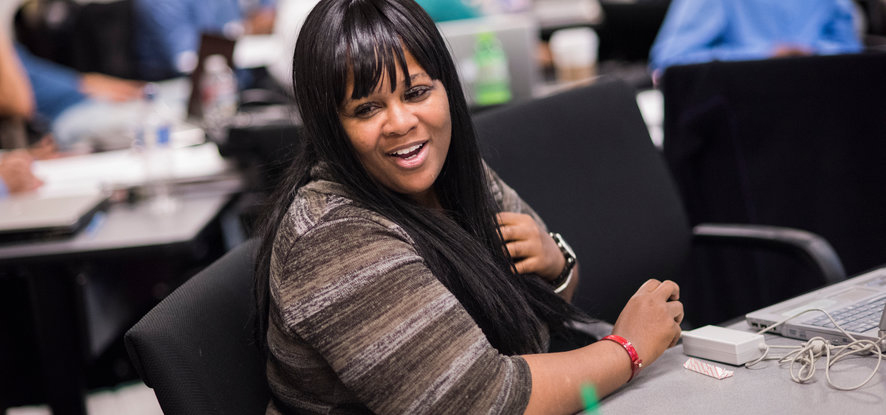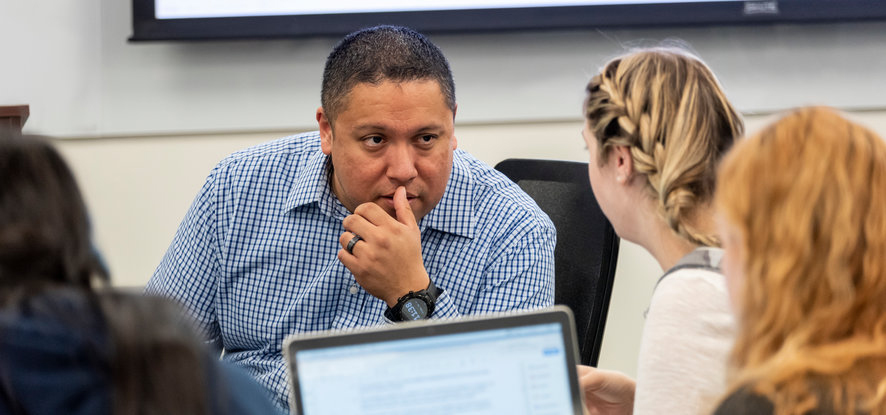Steps to Become an English Teacher

If you dream of sharing your passion for literature and language with others, becoming an English teacher might be your calling. It's a rewarding career that provides you with an opportunity to shape students' understanding of the world through English literature and language.
In this guide, we'll walk you through how to become an English teacher by pursuing a Master's in Teaching with a preliminary teaching credential.
Quick View:
- Step 1: Get a Bachelor's degree in English.
- Step 2: Get a Master's degree with a preliminary teaching credential.
- Step 3: Complete the required student teaching hours.
- Step 4: Get a background check and fingerprints.
- Step 5: Pass the required exams.
- Step 6: Obtain your license.
- Step 7: Ace your interview.
How to Become an English Teacher
There are several routes you can take to become an English teacher, depending on your current educational background and the grade level you wish to teach. This guide will walk you through the steps to becoming an English teacher by getting your undergraduate degree in English and pursuing a Master's in Teaching with a preliminary teaching license.
Step 1: Get a Bachelor’s Degree in English
You'll start by earning a Bachelor's degree in English. In your English classes, you'll study a diverse range of literary genres, from the classics to contemporary works. These English classes will not only introduce you to various writing styles but also provide insights into the historical and cultural contexts that shape literature.
Your undergraduate program will also help you develop essential language skills, which are essential for any aspiring English teacher. You'll study the nuances and complexities of the English language, understanding its evolution over time. This foundational knowledge is key to effectively teaching grammar, syntax, and vocabulary to your future students.
You'll explore the relationships between language, culture, society, and history. This understanding is crucial for teaching English effectively, as it enables you to make the content of your English classes engaging and relevant for your students.
When you complete your degree, you'll have a comprehensive understanding of both literature and language that will equip you with the knowledge and skills to confidently step into an English teaching role.
Step 2: Obtain a Master’s Degree With Preliminary Teaching Credentials
An advanced degree in education, such as a Master's in Teaching, will not only strengthen your skills but can also help you stand out in the applicant pool for English teaching jobs. Pepperdine University’s Graduate School of Education and Psychology offers a Master of Arts in Teaching (MAT) program that is a perfect mix of theory and hands-on experience. The program is perfect for prospective teachers who are ready to take their education to the next level, as the 11-month program meets the requirements for your preliminary teaching credentials.
The MAT program at Pepperdine University covers everything from English teaching strategies and lesson plan development to effectively managing a classroom. You'll learn to adapt your teaching to various learning styles. The hybrid format is flexible, catering to different lifestyles and preferences, whether you prefer in-person learning or online classes.
The program includes the latest in educational technology, explores different educational philosophies, and addresses current issues in education. This comprehensive approach ensures you walk away not just with a teaching certificate but with a full arsenal of skills that will make you an effective educator.
Step 3: Complete The Required Student Teaching Hours
In any teacher preparation program, completing the required student teaching hours is a key step in your professional development. At Pepperdine University, we prioritize giving you extensive, hands-on student teaching experience with over 200 top-tier teaching sites to ensure that you gain practical experience in a real classroom environment with experienced teachers, which is crucial for your development as an educator.
Through student teaching, you'll gain a deeper understanding of what it means to be a classroom teacher. It's a period of significant growth, where you'll transform theoretical knowledge from your education courses into effective teaching practices. You'll get advanced training in lesson planning and execution, allowing you to apply the pedagogical knowledge and English teaching strategies you've learned in a real-world setting with real students.
The student teaching experience also provides you with insights into various aspects of classroom management and the dynamics of student-teacher interactions. You'll learn how to handle diverse classroom situations, from planning lessons that cater to different learning styles to managing classroom time effectively.
You'll get to observe experienced teachers in action, gaining insights into effective teaching methods and classroom management skills. This practical experience is complemented by regular evaluations and feedback sessions, which are instrumental in shaping your teaching skills.
Step 4: Get Background Checked and Fingerprinted
All prospective teachers must complete a criminal background check and fingerprinting. This process is essential for the safety and protection of students and adds to the credibility and trustworthiness of teachers in the educational environment.
Step 5: Pass The Required Exams
Before you can get your license, you'll need to pass the required exams, which can vary by state. Most states require passing a core exam as part of the licensure process. This typically includes sections on reading and writing, which are fundamental for any English teacher. The core exam ensures that you have a solid grasp of the basic principles of English language arts and can effectively communicate this knowledge to students.
In addition to the core exam, some states may require a more comprehensive exam or specialized licensure exams. Passing these exams demonstrates your knowledge in the subject area and your readiness to meet the diverse needs of your students.
These are essential in ensuring that you meet the high standards expected of educators. By successfully passing these exams, you prove that you have the necessary knowledge and skills to be an effective English teacher. This step is a significant milestone in your journey, moving you closer to fulfilling the educational requirements for becoming a licensed and certified English teacher.
Step 6: Obtain Your License
Once you successfully complete your education and pass the required exams, you’ll be eligible to apply for your teaching license—a formal recognition that you are a qualified teacher who can teach English at the education level of your choice. This is your official gateway to entering the education field, particularly in public schools, where a teaching license is typically a mandatory requirement. (Most private schools also require a teaching license, but it isn't always a requirement.)
Step 7: Ace Your Interview
Finally, you'll be ready to start the hiring process for your dream job. Once you secure an interview, you'll want to make sure to put your best face forward and showcase your skills. Here are some tips for interviewing for your first teaching job:
- Prepare ahead of time. Before the interview, research the school or district so you
understand their educational philosophy, curriculum, and the demographics of the student
population. This knowledge will help you tailor your responses and show that you’re
genuinely interested in being a part of their community.
- Highlight your experience. Use your teaching experience, whether from student teaching,
volunteer work, or other educational roles, to provide concrete examples of how you've
effectively managed a classroom, created engaging lesson plans, or handled challenging
situations.
- Showcase your professional skills. Highlight your skills in communication, collaboration,
and problem-solving. Discuss any special skills or experiences, such as proficiency
in educational technology, experience with special education, or ability to teach
a second language.
- Address current educational trends. Be prepared to discuss how you incorporate current
trends in education into your teaching. This could include topics like social-emotional
learning, inclusive education, or integrating technology into the classroom.
- Ask insightful questions: Prepare thoughtful questions about the school’s culture,
professional development opportunities, and expectations for teachers. This shows
your enthusiasm for the role and your proactive approach to becoming a part of the
school community.
- Follow up after the interview: Send a thank you note expressing your appreciation
for the opportunity and reiterating your interest in the position. This is a professional
way to close the loop and leave a lasting positive impression.

Other Job Opportunities for English Teachers
Once you complete your teacher training program and obtain your teaching certification, your career options extend beyond the traditional middle school teacher or secondary school teacher.
Here are some other opportunities to put your skills and education to use:
Elementary School Teacher
In an elementary teaching position, you'll teach foundational skills in reading, writing, and communication amongst other subjects. At the elementary level, you have the opportunity to use creative methods to engage young minds and lay the groundwork for their future language development. Additional coursework and educational requirements might be needed such as a multiple-subject credential. To become an elementary school teacher, you’ll need to meet your state’s certification requirements which vary by state.
College English Professor
If you decide to pursue a doctoral degree, becoming a college English professor is an excellent path. At the post-secondary level, you'll teach advanced literary theories, research, and critical analysis. You'll engage with students at the undergraduate and graduate levels, guiding them through complex texts and helping them develop sophisticated analytical and research skills.
Reading Specialist
As a reading specialist, you focus on helping students develop their reading skills, particularly those who struggle with literacy. This role involves assessing reading abilities, creating individualized plans, and using various strategies to improve reading comprehension and fluency. Reading specialists work closely with students, head teachers, and parents to ensure consistent progress and support in students' reading development.
While you may need to pursue additional academic certification requirements, each of these roles leverages your expertise in English and your passion for teaching, allowing you to make a significant impact in various educational settings. Whether in a traditional classroom or a specialized teaching role, your skills as an English teacher can open many doors to fulfilling career opportunities.

What You Can Expect to Learn in a MAT Program at Pepperdine University
At Pepperdine University, the Master of Arts in Teaching (MAT) program offers a comprehensive and immersive educational experience for aspiring teachers. Here's an overview of what you'll learn in this program:
Instructional Design and Psychological Foundations: This core component focuses on understanding the complexities of instructional practices. You'll study the theoretical foundations of learning, exploring major learning theories, learner preferences, and outcomes. The course will guide you through the instructional process, emphasizing the identification of individual differences, creating optimal learning environments, and assessing learners to drive instruction. You'll learn to connect theory with practice, designing comprehensive and meaningful instructional sequences for K-12 students.
Literacy Instruction and the Common Core State Standards: A significant focus is placed on literacy instruction aligned with the Common Core Standards, equipping you to address the diverse needs of students in becoming proficient readers and writers. You'll explore the developmental continuum of literacy, understanding the historical and theoretical foundations, and the sequence and delivery of literacy instruction. The course emphasizes collaboration with specialists in assessing and planning developmentally appropriate literacy lessons for diverse learners, including English learners.
Social, Cultural, and Ethical Perspectives in Education: You'll examine social, cultural, philosophical, historical, and ethical perspectives on the role of education and schools in society. It highlights the socialization function of schools, the diversity of the student body, intercultural relations, educational equity, and equity-minded reform and leadership. You'll learn to recognize your own values and biases, understand multiple perspectives of equity-based education, and grow as an ethical leader committed to social justice. The course also focuses on equipping you with resources to support students with varied experiences and needs.
Promoting Literacy with English Learners: You'll explore practical strategies for enhancing literacy among English language learners in both bilingual and general education settings. The course covers contemporary language acquisition theory and research-based techniques for inclusive and successful education. You'll learn about differentiating between linguistic ability assessment and the identification of special accommodations.
Special Populations in School Settings: You'll be introduced to the study of special populations, including individuals with disabilities and gifted learners. You'll develop skills for designing inclusive instruction, understanding relevant legislation, and creating a supportive learning environment. The focus is on differentiated instruction, cooperative classroom environments, and collaboration with families and professionals.
Contemporary Research in Education: You'll learn to evaluate the credibility and bias in published research, understand research design, and participate in a research practicum. The course prepares you to be an active participant in the field, applying educational theory in real-world settings.
Become an English Teacher With a Master’s In Teaching From Pepperdine University
Now that you know how to become an English teacher, it's time to take the next step. Pepperdine's MAT program offers a comprehensive curriculum that includes learning development, instructional technology, and pedagogical theory. With a small faculty-to-student ratio, we provide a supportive learning environment and focus on practical, hands-on experience.
We welcome applications from individuals who demonstrate a commitment to success. If you're passionate about shaping the minds of the future and fostering a love for English, our MAT program is the perfect starting point.